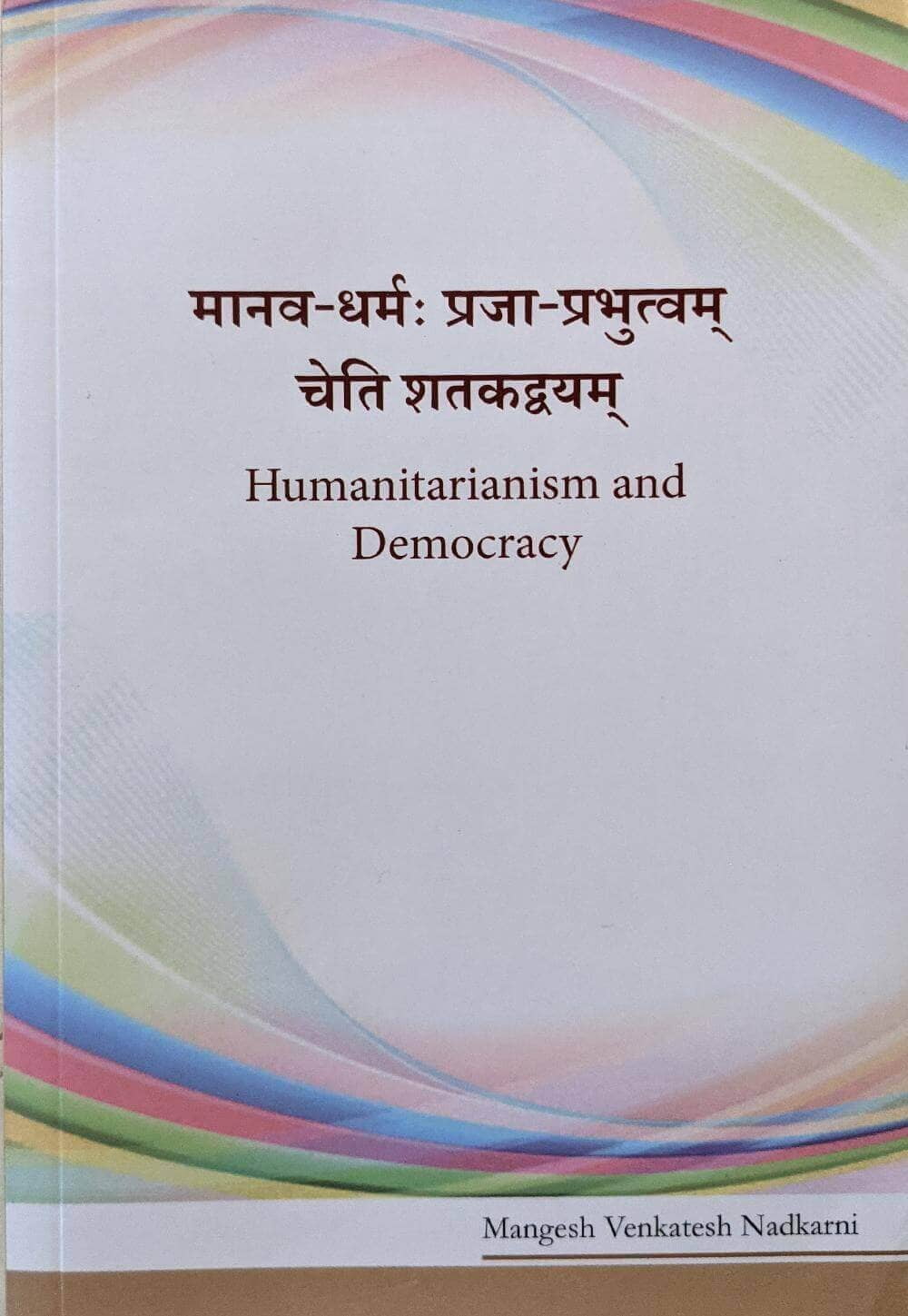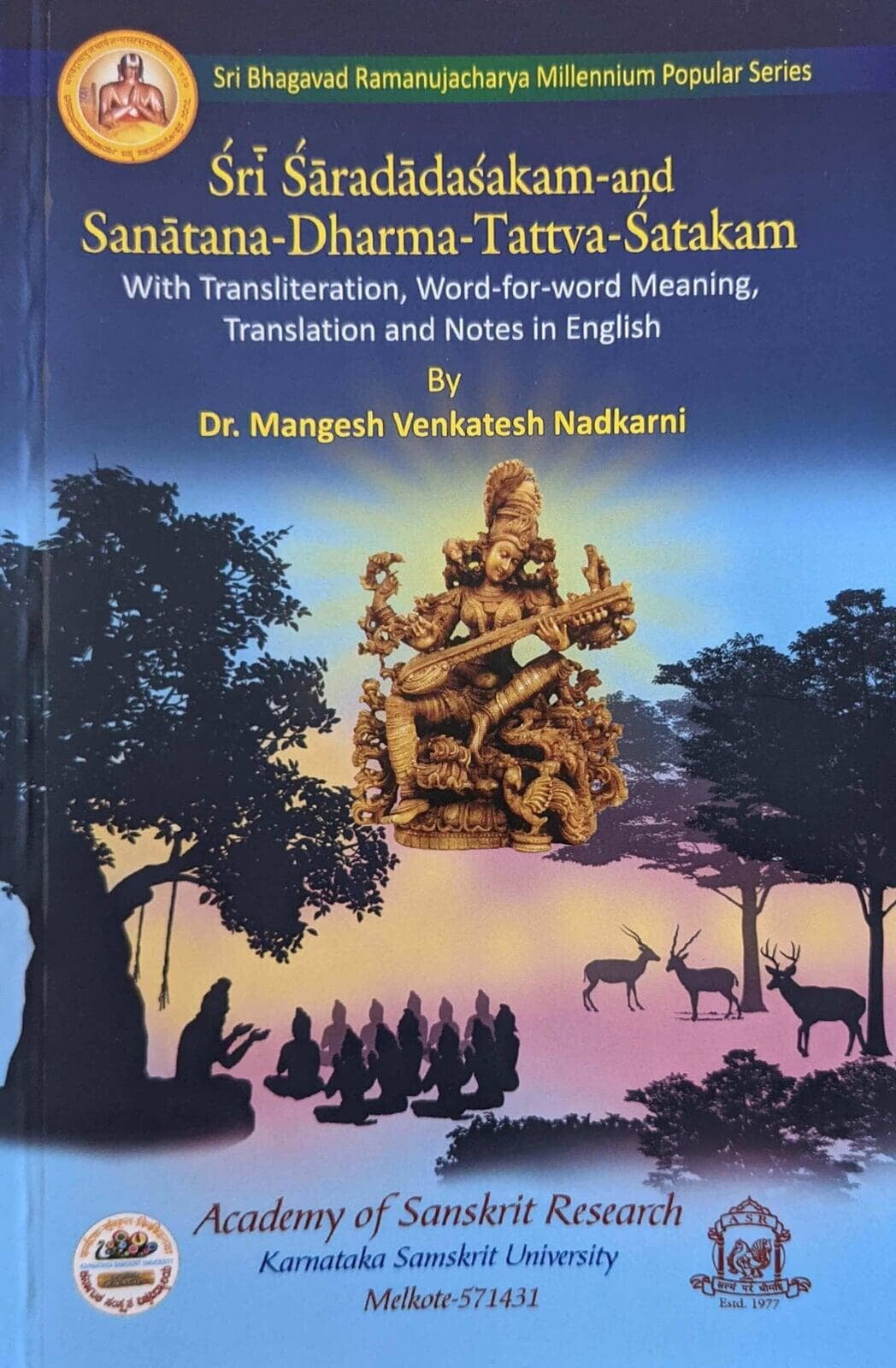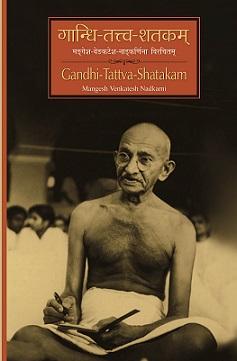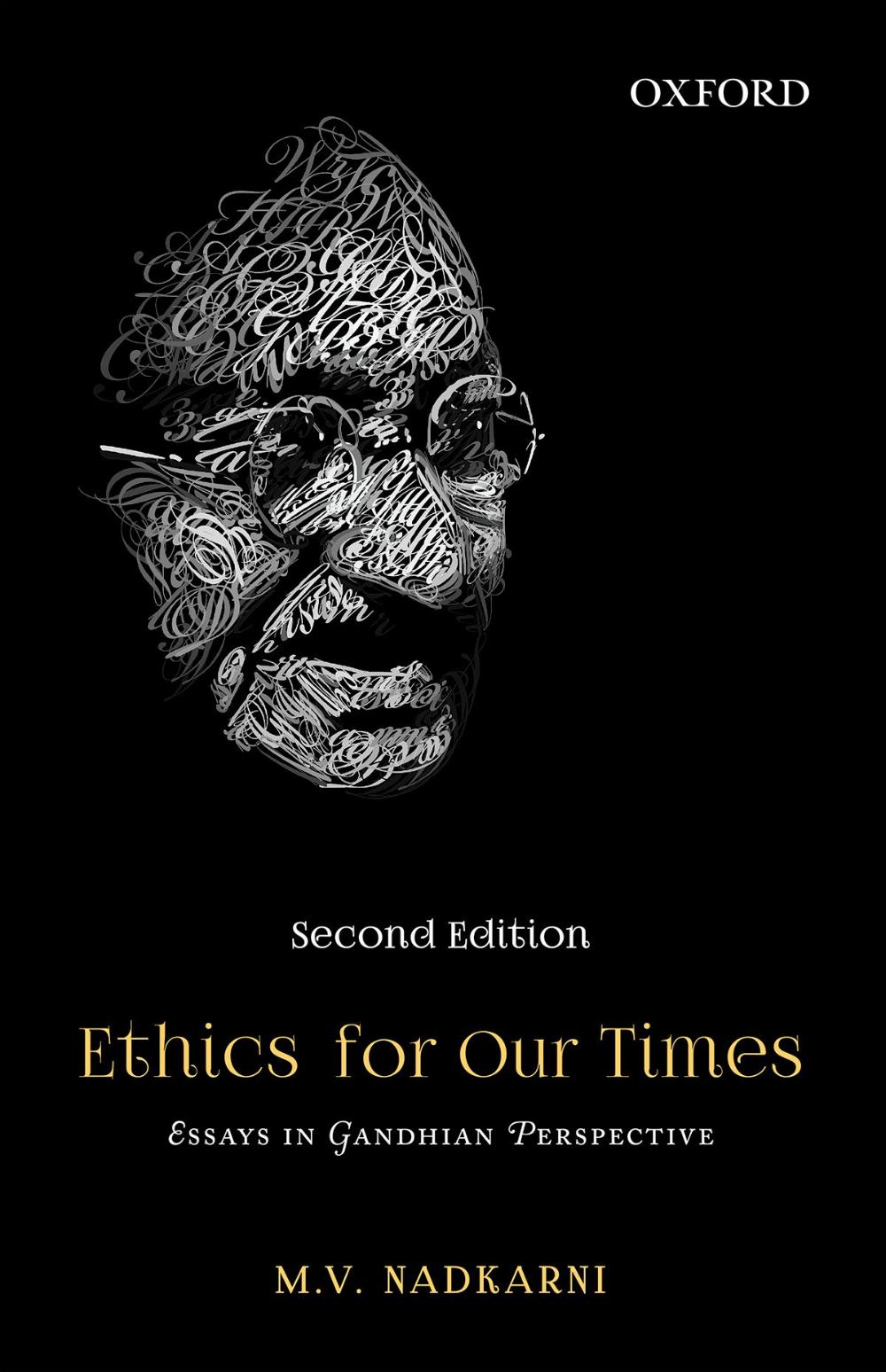Books

Vacanamrtam
The Śiva Śaranas of medieval Karnataka left a rich legacy of what are called Vacanas, or "Sayings," in Kannada. These Vacanas were far ahead of their times in social awareness. They deplored the caste system and discrimination, upheld the dignity of women in family and society, stressed on the priority of work, and advocated charity, in addition to devotion to One God - Śiva. They also imparted practical wisdom for living honourably and meaningfully in the world.
Though the book is primarily meant for those who do not understand the original in Kannada, Kannadigas can also benefit from it. This is because the most interesting (320) of the vast number of Vacanas (more than 20,000) are selected and made accessible in one place here. The translations here are not literal or mechanical. They bring out the intent of the Vacanas while being truthful to the original at the same time.
Buy Vacanāmṛtam at Amazon: https://amzn.in/d/3NYp0Bm

Samajikaneeti Kavya Guchchaha
(Kannada version)
A bouquet of poems in social ethics. This is a collection of five shatakams, or centuries of verses in Sanskrit with Kannada translation. The shatakams are respectively on environmental ethics, Gandhi's philosophy, Hinduism in a liberal Gandhian perspective, humanitarianism, and democracy.
The collection opens with a prayer to Sharada to grant good wisdom, and ends with a prayer to Mahalakshmi (Goddess of wealth), to end inequality, poverty, hunger, and homelessness from the Earth, and promote happiness for all.

Sāmājika Nīti-Kāvya Gucchah
The book Sāmājika Nīti-Kāvya Gucchah contains five śatakams (sets of hundred verses) on social ethics, inspired by the ancient Sanskrit poet, Bhartṛhari's Niti-śatakam. They are on environmental ethics, Gandhi's ethical philosophy, Hinduism from the ethical perspective of Gandhi, humanitarianism, and ethical philosophy of democracy including human rights. There are also two daśakams (sets of ten verses), being prayers to goddess Sharada and goddess Mahalakshmi, one at the beginning and the other at the end of the śatakams, respectively; seeking wisdom and end to poverty and inequality in the world. Though the original compositions are in Sanskrit, the book provides their lucid translation into English with word- to-word meaning and annotation.
The book is a short but comprehensive introduction to social, political, economic, and environmental ethics, and can be an aid in learning Sanskrit through modern problems showing the language as relevant for contemporary concerns as well.
Buy Samaajika Neeti-Kaavya Guchchah at Amazon: https://amzn.in/d/26RSQoL
Hindu Dharma: Hindu-Indu (Hinduism in the past and present)
This is an updated and revised version in Kannada, of Handbook of Hinduism, published in English earlier. It clears misunderstandings about Hinduism and explains how the religion evolved through several millennia. Hinduism has displayed both stability and dynamism to adjust to new challenges. The book conveys the liberal philosophy of Hinduism in detail in a Gandhian perspective.


Aadhunika Odugarige Bhagavadgeete
This is a Kannada version of the The Bhagavadgita for the Modern Reader - History, Interpretations, and Philosophy, published earlier in Englsih. It traces the 'career' of the Gita, changing from a religious text to becoming a guide to life on a global scale. The book reviews the interpretations of over thirty philosophers, and also clears misunderstandings about the Gita, showing it to be a progressive, egalitarian and liberal philosophy.
Humanitarianism and Democracy
This volume has two Shakatakams, or centuries of verses in Sanskrit with transliteration, word-to-word meaning, translation and annotation in English. The verses are on the virtue of a religion based on humaneness and love, and on democracy in which each citizen participates with full awareness of both rights and duties which are explained.


Sri Sharadadasakam and Santana Dharma Shatakam
Sri Sharadadasakam is a prayer to Sharada to grant the power to discriminate between truth and falsehood and to engage in good deeds.
Sanatana Dharma Shatakam is a composition in simple Sanskrit conveying the liberal philosophy of Hinduism in a Gandhian perspective.
Socio-Economic Change and the Broad-Basing Process in India
This book offers a new concept of inclusion of the marginalised in India — the Broad-basing Process. The author examines how through this process increasing numbers of marginalised social groups can enter into the social, political and economic mainstream and progressively derive the same advantages from society as the groups already part of it.The book critically reviews how the broad-basing process has worked in the past in India both before and after its independence.
Decentralized Democracy in India
This book provides a vantage point of comparison, of the actual reality of decentralisation in India with Gandhi’s vision of decentralised democracy, or what he referred to as Gram Swaraj. It looks at the historical evolution of panchayats from ancient times to India’s independence, and critically discusses the developments after. It examines the functioning of the present Panchayati Raj Institutions (PRIs) and the performances of urban local bodies. The basic thrust of this work is the need for constitutional reforms meant to strengthen and deepen democracy

Gandhi-Tattva-Shatakam
This book is a set of 108 verses conceived and presented in Sanskrit covering all the important aspects of Mahatma Gandhi's life, work and philosophy. It endeavours to enrich the Sanskrit language by introducing contemporary thinking for the benefit of youngsters as well as general readers.
Parisara-Niti-Shatakam
A hundred verses on Environmental Ethics with transliteration, translation and explanatory notes
.jpg)
.png)
The Bhagavad Gita for the Modern Reader: History, Interpretations and Philosophy
What is the Bhagavad-Gita? Is it just a religious text? When was it composed? How relevant is it to the modern world?
This book answers these foundational questions and goes beyond. It critically examines the Bhagavad-Gita in terms of its liberal, humanist and inclusive appeal, bringing out its significance for the present times and novel applications.
Ethics for our Times: Essays in Gandhian Perspective
Published earlier in 2011, this book now appears in its second and enlarged edition in 2014, published by Oxford University Press, New Delhi. The second edition has an added Part IV on ‘Some Contemporary Concerns’.

Handbook of Hinduism: Ancient to Contemporary
Hinduism is much misunderstood, not only by non-Hindus, but also by Hindus themselves. It has been tried to be defined in terms of purity and pollution, caste hierarchy, Brahminism, idolatry, ritualism, cow-worship, other-worldliness and amorality! That is, anything which Hinduism is not. Some have even doubts if it is a religion at all!
Excerpts from reviews
Parisaranitishatakam
- Prof. Sharachchandra Lele
Ethics for our Times: Essays in Gandhian Perspective
- Prof.Sunder Sarukkai
Hinduism A Gandhian Perspective
- Shri M.V.Kamath
( Organiser ,August 31, 2008, p.13)
- Prof. Ali Khwaja
Decentralised Democracy in India: Gandhi’s Vision and Reality, jointly with N Sivanna and Lavanya Suresh
(Under publication by Routledge, expected release in 2017)
Social Science Research in India: Institutions and Structure, edited jointly with R S Deshpande, Academic Foundation, New Delhi, 2011
Hinduism: A Gandhian Perspective, Ane Books, New Delhi, 2006 (1st edn), 2008 (2nd edn), 2010 (Hindi edn. Tr. By Parimala Ambekar
Gandhiji’s Approach to Religion (booklet based on a lecture), Gandhi Centre for Science and Human Values, Bharatiya Vidya Bhavan, Bangalore, 2007
Landmarks in the Development of Social Sciences During the 20th Century (ed), Allied, New Delhi, 2002.
Poverty, Environment, and Development. Edited jointly with Adrian Hayes. Bangkok: UNESCO. 2001.
Pollution Control in the South and North. Jointly with O J Kuik, F H Oosterhuis, G S Sastry, and A E Akkerman. New Delhi: Sage. 1997.
Agricultural Policy: Issues, Concepts and Instruments, Development Research Group, Study 5, Reserve Bank of India, Mumbai, February 1993
Planning for Social and Economic Development – Essays in Honour of Professor D M Nanjundappa, Edited jointly with R Bharadwaj, Sage, New Delhi, 1992
India: The Emerging Challenges – Essays in Honour of Professor V K R V Rao, Edited jointly with A S Seetharamu and Abdul Aziz, Sage Publications India Pvt. Ltd., New Delhi,1991
Organization of Rural Labour and the Role of Government Unions and Voluntary Agencies, under the National Commission on Rural Labour, 1990
Political Economy of Forest Use and Management. With S A Pasha and L S Prabhakar. New Delhi: Sage. 1989.
Farmers’ Movements in India, Allied Publishers, New Delhi, 1987
Karnataka Raitha Horaatagalu, (Farmers’ Struggles in Karnataka) (in Kannada), Printers Prakashana, Bangalore, 1986.
Socio-Economic Conditions in Drought-prone Areas. New Delhi: Concept. 1985.
Integrated Child Development Services – An Assessment, jointly with K G Krishnamurthy, UNICEF, New Delhi, 1983
Marketable Surplus and Market Dependence in a Millet Region, Allied Publishers, New Delhi, 1980.
Socialist Agricultural Price Policy – A Case Study of G D R, Peoples’ Publishing House, New Delhi, 1980
A Report on the Socio-Economic Survey of Villages under the Jayakwadi Irrigation Project – submitted to the Government of Maharashtra, in June 1976 (Unpublished).
Impact of Drought on Rural Life. Jointly with V V Borkar. Mumbai: Popular Prakashan. 1975.
Agricultural Prices and Development with Stability, National Publishing House, Delhi, 1973.
Local Taxation in Urban Areas, jointly with D M Nanjundappa, Karnataka University, Dharwar, 1967
Excerpts from reviews
Parisaranitishatakam
- Prof. Sharachchandra Lele
Ethics for our Times: Essays in Gandhian Perspective
- Prof.Sunder Sarukkai
Hinduism A Gandhian Perspective
- Shri M.V.Kamath
( Organiser ,August 31, 2008, p.13)